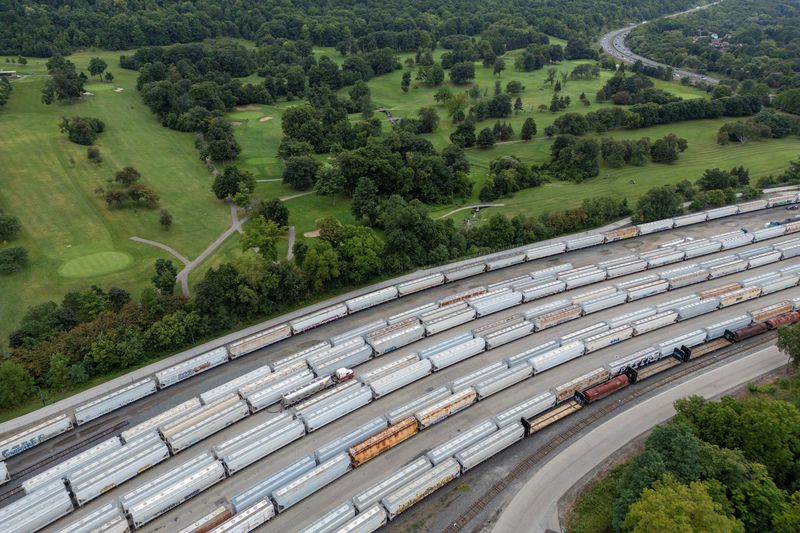By Tom Polansek and Promit Mukherjee
CHICAGO/OTTAWA (Reuters) - A looming stoppage of freight railway operations across Canada would disrupt North America's agricultural supply chain, snarling shipments of everything from wheat to fertilizer and meat.
Unless last-minute labor agreements are reached, both Canadian National Railway (TSX:CNR) and Canadian Pacific (NYSE:CP) Kansas City, an effective duopoly, will shut nearly all freight rail services in Canada for the first time at midnight on Thursday.
Canada is the world's top exporter of canola, used in food and biofuel, and of potash fertilizer, as well as the No. 3 wheat exporter. While a lockout or strike would directly involve 10,000 Canadian employees of the railroads, not those in the U.S., it would have knock-on effects on the U.S. economy due to the countries' criss-crossing rail lines.
Nearly three dozen North American agriculture groups, in a joint letter to the U.S. and Canadian governments on Monday, urged action to avoid a stoppage.
"The impact of a strike would be particularly severe on bulk commodity exporters in both Canada and the United States as trucking is not a viable option for many agricultural shippers," the letter said, citing large volumes and vast distances.
The rail operators have said lockouts will begin on Thursday. The Teamsters union, which is demanding better wages, benefits, and crew scheduling, has issued a Thursday strike notice to CPKC (TSX:CP).
The stoppage will halt shipments of U.S. spring wheat from Minnesota, North Dakota and South Dakota to the Pacific Northwest for export, said Max Fisher, chief economist at the National Grain and Feed Association.
CPKC ships grain from the Dakotas and Minnesota to west-coast export terminals via Canada, according to the U.S. government.
U.S. farmers still have nearly two-thirds of the spring-wheat crop to harvest, the U.S. Department of Agriculture said on Monday. Soy, corn and canola harvests are still a few weeks away in North America.
Canada's prairie elevator network would run out of storage capacity within 10 days of a stoppage, said Mark Hemmes, head of Quorum Corp, which monitors Canadian grain handling and transportation.
Shippers are also concerned about U.S. corn products heading to Canada. In 2023, Canada was the top destination for U.S. ethanol exports, and almost three-quarters traveled by rail, according to USDA.
"We just can't have the railroads not operating," Fisher said.
The U.S. exported $28.2 billion of agricultural products last year to Canada, its third-largest destination for agricultural exports behind China and Mexico, USDA said.
The U.S. imported $40.1 billion of Canadian agricultural products last year, making Canada the second-largest origin of U.S. agricultural imports behind Mexico, the agency said.
About 85% of the 13 million metric tons of U.S. potash imports last year came from Canada, nearly all of which crossed by rail, according to USDA.
'NO GOOD TIME'
U.S. corn farmers apply fertilizers in fall and spring, but potash imports from Canada are consistent throughout the year, said Krista Swanson, chief economist for the National Corn Growers Association.
"Given constant trade flows and the importance of the trade relationship between the two nations, there is no good time for this to occur," Swanson said.
The railways move an average of 69,000 tons of fertilizer product per day, equivalent to four to five trains, said Fertilizer Canada spokesperson Kayla FitzPatrick. Disruptions will cost the industry C$55 million ($40.34 million) to C$63 million per day in lost revenue, not including logistical and operational costs, she said.
Canadian meat producers warned that a rail stoppage would result in millions of dollars in losses and waste.
The Canadian Meat Council and Canadian Pork Council said some processing plants expect to lose up to C$3 million a week, and noted these facilities would be forced to shut down within seven to 10 days of a rail stoppage. Once the railways resume service, it would take two to five weeks for plants to return to normal capacity.
There is concern that the movement of Ontario soybeans to export markets, primarily Japan, will completely stop just before the harvest, said Crosby Devitt, CEO of Grain Farmers of Ontario.
With crop-shipment delays lasting beyond a week, companies must pay contract penalties and demurrage for ships waiting for grain to arrive, piling significant cost onto the industry, said Wade Sobkowich, executive director of the Western Grain Elevator Association.

"We'll be playing catch-up for the rest of the harvest year, till next July," he said.
($1 = 1.3634 Canadian dollars)
